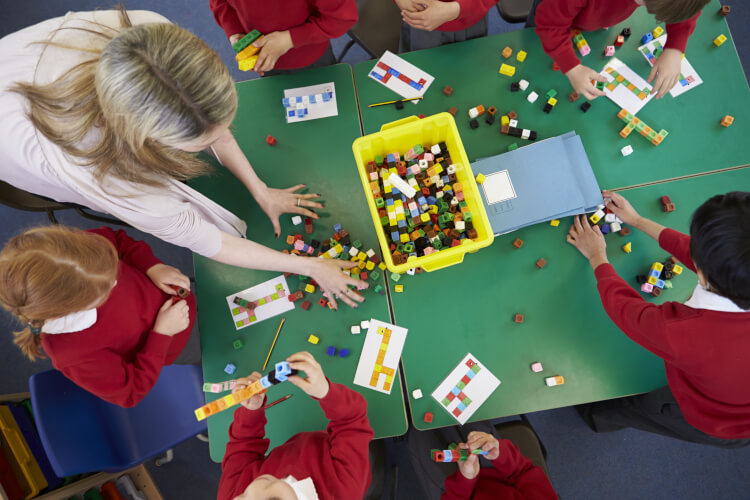When students develop a positive attitude towards mathematics early on, they are more likely to carry that attitude in their later school years and into adulthood.
But for this to happen, they need to experience enjoyment and success in the subject early on – at home and in the classroom. When young learners feel encouraged to learn mathematics and take pride in their accomplishments, they build upon those successes which boosts their confidence and skills.
One study showed that students who enjoyed or took pride in mathematics had better long-term achievement, and successful performance in the subject increased their positive emotions over the years. That’s why it’s so important to start inspiring a love of mathematics at an early age – it prevents the negative cycle of children believing “I’m not good at math(s).”
In his first speech of 2023, UK Prime Minister Rishi Sunak outlined plans to make mathematics mandatory for all students in England until the age of 18. The intention is to address the need for greater analytical skills in a world where data and statistics are increasingly important in the workforce.
Here are our top seven strategies to spark an early appreciation for mathematics, so students feel eager and enthusiastic about embracing mathematics willingly in later years.
1. Using the language of mathematics in real world situations
One of the most powerful ways is by showing students how relevant mathematics is in real-world scenarios. By jumping onto those teachable everyday moments, you’re planting the seeds of mathematics in your early learners!
Look for opportunities to help your students discover and explore mathematical concepts, like size and speed comparisons.
When they casually mention math(s)-related topics or words in their conversations or playtime, use it as an opportunity for a fun and interactive exploration. It could be a great chance to cultivate their understanding even further.
For example, they might say, “Look, that bird is flying so fast and high!”
Use this opportunity to ask them follow up questions to extend their learning:
- How high do you think that bird is flying?
- Is it as high as the school building?
- How fast do you think the bird is flying?
- Do you think the bird is flying faster than a car?
2. Offer a variety of learning materials and approaches
With different learning styles, it’s essential to provide an array of teaching methods for them to discover what helps them learn best.
To engage little mathletes from the get-go, toys and objects that inspire exploration through tactile play can prove invaluable. Here are other ways to get younger students engaged:
- Exploring their environment: Help them notice patterns in nature or learn about spatial relationships by playing with toys in a sandbox.
- Collaborating with others: Math(s) can be fun and rewarding when done with others. Encourage them to work together and discuss problems and solutions.
- Start a mathematics-themed book collection: Reading helps, and it doesn’t have to be stories with mathematical themes. Different types of books help to keep their minds open about different options and different opportunities.
- Using technology: This allows learners to play a more engaged role in experimenting, investigating and problem solving.
- Gamified activities: This is a great way to blend extrinsic and intrinsic rewards to maintain students’ learning motivation and momentum.
3. Get to know your students
Every student is a one-of-a-kind individual. Having meaningful conversations with them in and outside of the classroom is a simple but powerful way to really get to know who they are.
It can also be challenging to engage in meaningful conversations with everyone, in a class of 20-30 students. To bridge this gap, try these methods:
- Simple survey: At the start of the new year, hand out a survey with some questions to find out more about their likes, dislikes and their thoughts. You can also learn a lot about your students from their parents.
- Create a system: Each week, pick three students each lesson (you can go alphabetically down the roll) and ask them open questions. This allows you to interact with the whole range of students in a systematic order – what are their areas of strengths, what are parts of mathematics that they enjoy?
As we understand our students better through the year, we can use their strengths and accentuate them. With parts that students struggle with, we can provide additional support in those areas.
4. Connecting mathematics to existing knowledge
If we read a book in the middle, we would be confused because we don’t have any background knowledge. Sometimes, our students can be learning mathematics in the middle, unintentionally.
To make mathematics learning easier, we need to learn from our students.
- What are the ‘early chapters’ or gaps that are missing in their understanding?
- What is it that they already know?
- What are things that they don’t’ know that are important to the things we’re learning today?
Once we have a good grasp of this, we can modify the way that we explain and present concepts to help each student succeed. Knowing how your students learn best changes the way you teach.
5. Show them the progress they’ve made
Celebrate your students’ achievements and watch their confidence bloom! Introduce a progress chart to acknowledge the hard work they’ve put in throughout the year. At mid-year, rally around them and reward them for how far they have come – award students with certificates or a special badge to give them that extra morale boost.
6. Interesting careers
There are many jobs out there that require mathematics – the opportunities are infinite!
Introduce students to different roles in the STEM field. Even if they wish to be in a profession beyond the STEM industry – show them how it can be connected to mathematics.
Have students who are keen to pursue design? Show them the relevance of proportion, ratios, and measurement. Use their interests to help motivate them to engage with the subject.
7. Mindset matters
Carol Dweck’s research showed us why the Growth Mindset is essential for thriving in mathematics. She stressed the importance of challenging fixed mindsets which could potentially be holding someone back from achieving success in mathematics.
Here are tips on how to break your students’ limiting attitude:
- Celebrate mistakes and show students how to learn from them
- Praise the process rather than the person
- Group your students into mixed ability groupings to allow students to learn from each other
- Recognise your own attitudes towards math(s) and be mindful of how you project this. Is there a topic you don’t enjoy teaching?
- What is your mindset towards your students. Do you already have perceptions of which students might be good at the subject, and those who are not?
Every child has the potential to excel in mathematics.
Mathematics has the power to open up a world of opportunities for students. By cultivating an early passion, we can give them the confidence and toolkit needed to be successful in life.
Unleash your students’ inner mathlete and join World Maths Day – the world’s largest online event that celebrates mathematics. Watch their excitement soar as they get to compete with learners from all over the globe!











